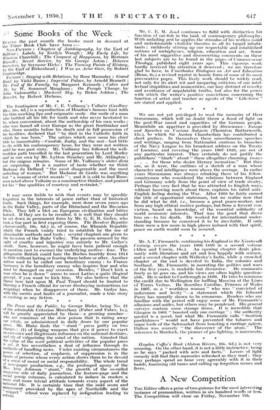Mr. A. F. Fremantle, continuing hisEngland in the Nineteenth Century,
covers the years 1806-1810 in a second volume (Allen and Unwin, 16s.). An opening chapter deals plea- santly with literature and art and less happily with science, and a second chapter with Wellesley's India, while a crowded chapter at the end is devoted to India, the colonies and Scotland. Mr. Fremantle, in narrating the politics and wars of the five years, is readable but discursive. He comments freely as he goes on, and his views are often highly question- able. He is unfair to Castlereagh in 1809. He tries to minimise the credit due to Wellington for baffling Masse= at the Lines of Torres Vedras. He describes Caroline, Princess of VI'ales in 1807, as a " worthless woman " who was " convicted of indecorum and levity "—a statement which Sir Edward Parry has recently shown to be erroneous. Readers who are familiar with the period will enjoy sonic of Mr. Fremantle's allusions and asides, but others may be perplexed. His general surveys contain some strange items. It is incredible that Glasgow in 1801 " boasted only one carriage " ; the authority quoted is a novel, but what Mr. Fremantle calls " Scottish pawkishness " would not have prevented the tobacco and sugar lords of the Saltmarket from boasting a carriage apiece. Dalton was scarcely " the discoverer of the atom." The reference to Murdoch, the pioneer of gas lighting, is inaccurate.
* * * *










































 Previous page
Previous page